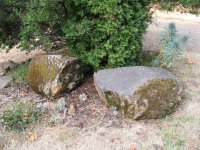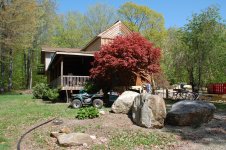When I built our house, the county required us to perk test the soil. I called an environmental spec company. The man came out - he had 2 5gal buckets of water - he carried on and I the other - back into the woods and up the hill where the house would be. When we got there, I asked - what do we do now? He said I'm going to dig a hole about 2' deep and pour in water until the hole holds the water.
Now about rocks. This is in the Ozark Mountains. I had to dynamite the mail box, a year dynamiting the water line - want to dig a hole? get out a stick of dynamite. I had an ATF license to mix binary explosives just to plant the waterline.
He dug the hold 16", hit bedrock. If you don't know, bedrock is a really big rock. Ha.
We poured in the water. Took about 2 gal and dumped the rest. He said, NOW I will come back tomorrow and we will see how much water it takes to fill it again to find how much was absorbed by the soil.
The next day - carried another bucket of water into the woods and up the hill. NOT one drop of water had disappeared. Then he said, well hell, this soil won't even perk. flunked the test, We had to haul in about 15 loads of dirt for septic.
Another short story. When I was much younger and started coming to Branson, I rode a motorcycle. I pulled into a campground. I said I wanted to camp for 2 nights. I was asked - Want any hook ups? I said - No, I just want a small square of grass to put my tent on and that will be great! He looked at me kinda funny and said "boy, there ain't a patch of grass in this whole damn county, this is Stone County. Never a more true statement.
The hard thing about using dynamite is that after you crack up bedrock, then you get to dig out the smaller rocks like these. I would dynamite with 30" spacing, 30' a shot.
View attachment 717816



